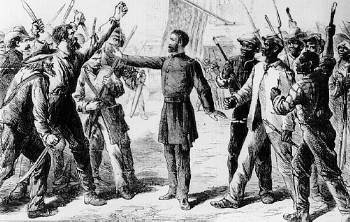The Election Of 1868: Ulysses S. Grant vs. Horatio Seymour
Intro: Hello and welcome back to another edition of the presidential election articles as I'll be going over the election of 1868, the Civil War is finally over but things haven't been easy in the last several years as the famous Union Army General, Ulysses S. Grant takes on the former Governor of New York, Horatio Seymour...let's get into it.
The Reconstruction Era
By 1865, the Civil War had reached its conclusion with the Union coming out on top with all but three confederate states (Texas, Mississippi and Virginia) being brought back into the country, not to mention that the state of Nebraska has now officially become a part of the U.S. thus allowing them to vote in the up-and-coming election.
The Republican Party meanwhile have been busy implementing various laws into action like the 13th Amendment which abolished slavery within the U.S. and the 14th Amendment which focused on granting citizenship and equal protection rights under law to the former slaves. In addition to these amendments, many African American males were now allowed to vote and this period of sweeping change for African Americans and integration in the U.S. has referred to by many historians as "The Reconstruction Era".
However, many people (especially Southerners) were steadfastly against all of these opportunities that African Americans were getting with many middle-class white workers fearing that they would lose their jobs to these newly freed slaves and others were against the idea of blacks having the same equal rights as white people.
While tensions over what to do with the newly freed blacks was visible in many states as evident by the Memphis Riots and New Orleans Massacre of 1866, it was the heated arguments between the Republicans and President Andrew Johnson that are really going to take things to the next level.
Andrew Johnson's Presidency
Following Abraham Lincoln's assassination at the hands of John Wilkes Booth in April of 1865, Andrew Johnson the former Military Governor of Tennessee and the Democratic vice president to Lincoln by way of the National Union Party became the 17th president of the United States.
Johnson was now in charge during one of the most important times in America's history as he now had to figuring out how the country should be able to proceed going forward and his ideas for a post-civil war America isn't going over well with many including the Radical Republicans, who were Republican politicians who wish to exterminate any and all vestiges of slavery in the U.S.
Instead of going along with these newly passed amendments that helped African Americans or punishing the former members of the Confederates States of America, President Johnson on the other hand wished to bring back all of the confederate states into the U.S. while also continuing the same policies of white supremacy within the government.
His also looking to pardon some if not all the confederates who took part in the war and establishing 'Black Codes' which will restrict many opportunities that African Americans will have. On top of this, Johnson made it a habit of vetoing every bit of legislation like the Civil Rights Act of 1866, the Freeman's Bureau Bill and the First Reconstruction Act of 1867 all of which supported civil and equal rights for African Americans.
For their part, the Radical Republicans responded by overriding the president's vetoes and this trend continued on until it reached its boiling point when Johnson attempted on numerous occasions to fire the Secretary of War, Edwin Stanton which resulted in Andrew Johnson becoming the first president to ever face impeachment.
Ultimately, Johnson avoided being impeached by just one single vote which came from Kansas Senator, Edmund Ross who went on to use this leverage over Johnson to get many special favors and reportedly Ross himself even got a slush fund by many Johnson supporters after the impeachment trial.
Even though he was found not guilty, Johnson's reputation as you can imagine was tainted by all of this and it would affect his chances for in the upcoming race...Speaking of which, let's take a look at the candidates each side is nominating for this election.
Seymour For President
Despite his attempts to run for president on his own terms, Andrew Johnson stood very little chance of getting the Democratic Party's nomination for president with the impeachment trial and his refusal to support the confederates during the Civil War being probable causes as to why.
Other names like Salom Chase, George Pendleton, Thomas Hendricks and Winfield Scott Hancock were also looking to become the nominee but one name who did get brought up was the Democratic Convention Chairman and former Governor of New York, Horatio Seymour who desperately did not want to be the nominee and refused to run as a candidate despite many in his party wanting him to.
By the time of the Democratic National Convention more and more delegates began to throw their support to the former New York Governor who continued to mention that he didn't want the nomination, but the delegates couldn't support any other candidate other than him, so Seymour finally gave in and reluctantly accepted his party's nomination for president.
The delegates within the convention also nominated the former Representative and Civil War Hero from Missouri, Francis Blair as Seymour's running mate with the party's platform in this election surrounding on the idea that all of these reconstruction laws are a step too fair by the federal government and that all of the previous confederate states need to be brought back into the country while also supporting the idea of using 'Greenbacks' as a form of currency that wasn't backed by gold or silver.
War Hero Turned Nominee
The Republicans decided to get rid of the National Union Party now that the war was over, and they chose Ulysses S. Grant who was the Military General who led the Union to victory during the Civil War as their nominee for president.
After witnessing the divisions that occurred between Andrew Johnson and the Republicans when it came to passing laws that would help newly freed African Americans, Grant and his running mate, Schuyler Colfax who was the then Speaker of the House from Indiana decided to run on the basis that the country can't forsake all of the casualties that were made during the Civil War to just have things go back to the way it was before.
The GOP are running on the slogan "Let Us Have Peace" as they support the idea of Black Suffrage in the South plus there willing to go along with things like open immigration, infrastructure spending and many other reconstruction policies.
So, we have our two candidates for the Democrats and the Republicans and now it's time to get into the campaigns that both parties ran on during this election.
Dirty Campaigning and Party Platform
Neither the Democrats nor Republicans are holding back when it came to making vicious and derogatory claims about each other with Republicans claiming that Seymour wasn't mentally fit to become president as his father committed suicide and he might do the same thing once the stresses of the job got to him.Republicans are also using political cartoons showing Seymour instructing those involved in the New York City Draft riots during the Civil War and Seymour himself even tried to get out of serving in the war all of which doesn't paint him in a positive light.
On the other side, the Democrats are making claims that General Grant was a drunkard and that a man with an alcohol problem wouldn't make for a good president of the United States.
They're also trying to paint Grant as an antisemitic by bringing up Grant's decision to issue General Order No. 11 which was an order that expelled all Jews from Grant's military district during the Civil War and even though Grant apologizes for this decision in a letter, it still is going to hurt his chances in this election.
Speaking of getting your chances hurt in this election, Horatio Seymour is running on a campaign that might have been acceptable to some back in the day but are beyond racist now with cartoons saying things like the Democrats are the party of the White people and that the Republicans were just the party of the N-word and that if you elect Grant for president then you're basically electing a N-word to run the country.
His running mate, Francis Blair isn't making things any better as his making numerous speeches claiming that " A semi-barbarous race of blacks who are worshippers of fetishes and poligamists and wanted to subject the white women to their unbridled lust."
The Democrats even had a slogan during their nominating convention which was "This is a white man's country, let a white man rule"...this is very ironic considering that in a hundred-and forty-years after this election, Barack Obama will become the first African American to be elected president under the Democratic Party but nevertheless many Northern Democrats and especially former slaves are not going to be voting for Seymour and Blair but instead throwing their votes for Grant as a result of all of this.
So now that we've gone over the presidential campaigns and each parties' platforms in this election, it's time to look at the results.
The Results
As you can see from the electoral map, Ulysses S. Grant becomes the 18th president of the United States with Grant easily winning in the electoral vote with 214 votes compared to Seymour's 80 electoral votes as you needed 148 or more votes to win in this election.
However, the popular vote was surprisingly closer than what most would've predicted with Grant getting 52.7% to Seymour getting 47.3% with a 5.4% difference in the popular vote separating the two.
The fact that many confederate states couldn't vote as they weren't brought back into the Union just yet, not to mention the crucial fact that many freed slaves and African Americans are allowed to vote and will most certainly be voting for the Republicans is what ultimately is going to give Grant the victory in this election.
So that's the election of 1868, the Republicans are back in the White House with Union General Ulysses S. Grant in charge but will just have to see in the next election article how good Grant's four years as president will turn out.
The Election of 1864: Abraham Lincoln vs. George McClellan
The Election of 1860: Abraham Lincoln vs. Stephen Douglas vs. John C. Breckinridge vs. John Bell
Be sure to follow me on Twitter @FullertonHakeem for more content like this and I will see you later.












Comments
Post a Comment